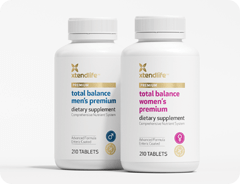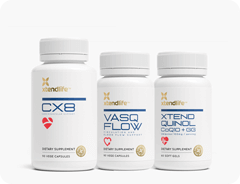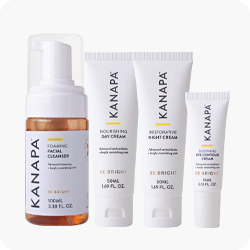With so many different supplements out there, how do you know which ones are right for you? One simple way you can compare is to look at the different forms of vitamins contained within them.
Vitamins come in a number of different forms, which has a direct impact on their efficacy, absorption rate and function. Quality supplements will contain the vitamins in their most bioavailable form – so you get the most benefit. Taking a supplement in a form that is not bio-available can cause strain on our bodies and end up doing more harm than good. That’s why it’s so important to understand the forms of the various vitamins in the supplements you take.
Choosing the right form is especially important for fat soluble vitamins (A,D, E and K) because of their higher risk of toxicity, so we’ll be focusing on this group in this blog.
Vitamin A: Natural vs Synthetic
Many people worry about vitamin A because of its toxicity. However, it is the retinoic acid form of vitamin A that is problematic.
Vitamin A is actually a family of substances called retinoids that include retinol, retinal and retinoic acid. These are called preformed vitamin A because they are in a form that the body readily uses. Retinol is the most usable of the three and can be converted to both retinal and retinoic acid in the body.
Plant sources contain ‘provitamin A’ called carotenoids, which can be enzymatically converted to retinol in your body. Carotenoids are the yellow-red pigments that give carrots, butternut squash and cantaloupe their vibrant, deep orange colour.
There are over 600 different carotenoids, but only three, beta carotene, beta cryptoxanthin and alpha carotene can be converted to vitamin A. Beta carotene is known to have antioxidant properties, and can help to neutralize free radicals that damage tissues, including those in the eye. This is the form that Xtendlife uses in all our supplements.
Synthetic vitamin A is often listed as vitamin A palmitate, retinyl palmitate or retinol palmitate. If you see this on your supplement label… walk away! Synthetic vitamin A is an isolate, which have been linked to problems with digestion, absorption, uptake and assimilation. Some research shows that long-term consumption of isolates may result in dry skin, eyes and lips, hair loss, sleepiness or fatigue, liver damage and bone demineralization.
Vitamin K1, K2 or K3?
Vitamin K is a great vitamin that provides a number of different health benefits. However, these benefits vary depending on the form of vitamin K you ingest.
Vitamin K1 (phylloquinone)
Found naturally in plants (especially green vegetables), K1 goes directly to your liver and helps you maintain healthy blood clotting.
Vitamin K2 (menaquinone)
Made by the bacteria that line your gastrointestinal tract (and from fermented foods), the biological role of Vitamin K2 is to help move calcium to where it is needed, such as the bones and teeth. This is the form I recommend for supplementation, as it is natural and non-toxic, even at 500 times the recommended daily allowance (RDA). Increasing your K2 by consuming more fermented foods is the most desirable way to increase your levels. The food that has the highest concentration of natural K2 is natto, which is a form of fermented soybeans.
Vitamin K3 (menadione)
This is a synthetic form that we do not recommend. It is important to note that toxicity has occurred in infants injected with synthetic vitamin K3.
Vitamin D2 or D3
Vitamin D is known to have a large number of health benefits, including its widely-known support for bone density. Supplemental vitamin D comes in two forms - ergocalciferol (vitamin D2) and cholecalciferol (vitamin D3).
Both forms of vitamin D were once regarded as equivalent and interchangeable. However, we know a lot more about vitamin D today, and studies are showing compelling evidence that vitamin D3 is the best form to take in oral supplementation. According to the latest research, vitamin D3 is more potent in raising and maintaining vitamin D concentrations than vitamin D2. Vitamin D3 is also the same type of D vitamin created in your body when you expose your skin to sunlight.
Regardless of which form of a vitamin you use, your body must convert it into a more active form, and vitamin D3 is converted 500 percent faster than vitamin D2. Vitamin D2 also has a shorter shelf life, and its metabolites bind poorly with proteins, further hampering its effectiveness.
Unfortunately, vitamin D2—which is a synthetic version made by irradiating fungus and plant matter—is the form of vitamin D most often prescribed by doctors in the U.S. Hopefully this will change sooner rather than later.
Vitamin E, Tocopherols and Tocotrienols
Vitamin E is a fat-soluble vitamin with antioxidant properties. Vitamin E exists in eight different forms: alpha-, beta-, gamma-, and delta-tocopherol; and alpha-, beta-, gamma-, and delta-tocotrienol. Alpha-tocopherol is the most active form in humans because it is the preferred form of vitamin E transported and used by the liver.
Vitamin E supplements are available in natural or man-made forms. Synthetic vitamin E does not come from a natural food source and is generally derived from petroleum products. Due to its chemical structure, it is much less potent than natural vitamin E. It is also significantly less bioavailable, with decreased overall absorption and utilization. Synthetic forms are labelled “dl” (for example, dl-alpha-tocopherol). Natural forms are usually labelled with the letter “d” (for example, d-gamma tocopherol). The best type of vitamin E should be a combination of tocotrienols and tocopherols – as they work in synergy to provide optimum benefits.
Know your vitamin form!
This is just a brief introduction to the important differences between different forms of vitamins. I would strongly encourage you to do your research before purchasing any supplement. Any reputable supplement company should have the details of their vitamin forms available on their website or the Supplement Facts panel on the product label.
At Xtendlife we use the most bio-available vitamin forms to ensure optimum absorption and maximum benefit to you. If you have any questions about our ingredients, you can either look them up here.


 Supplements
Supplements Superfoods
Superfoods Bundles
Bundles









